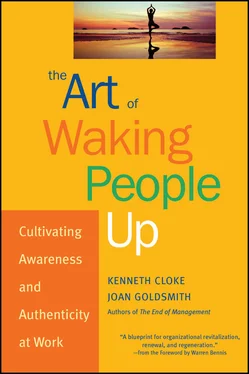Yet negative assessments can be heard not as verdicts but as challenges that encourage us to prove them wrong. Thus every external version of who we are is false because it is merely some single person’s version—yet true because it reveals an internal disabling belief that, once shattered, can wake us up and make us more curious about who we actually are. Because each of us can get better at anything we choose to do, the way we respond to feedback reveals more about our self-confidence and skill in interpreting critical input than it does about our innate abilities. We can all learn, improve, and change every aspect of our lives. All we have to do is want to do so.
Moreover, a primary characteristic of leadership is authenticity. We are all drawn to authentic leaders. We admire them, count on them, and wonder what mysterious quality attracts us to them. Yet their secret is easy to discover: they are clear about who they are. They are in touch with their own inner truths. Leadership is ubiquitous. It exists at every organizational level through a myriad of roles and a wide variety of expressions and modes of operating. To become leaders in our own work lives, each of us needs to develop our capacity for authenticity. Only when we wake up ourselves, develop a clear sense of who we are, and act with integrity, can we begin to ask the same of others.
Democratic organizations require employees who are not merely awake but willing to make their awareness and authenticity congruent with their values and take responsibility for improving their work lives. Awareness and authenticity allow us to translate our intentions into congruent behaviors and committed action. Until awareness translates into commitment and commitment into action, we can delude ourselves into thinking we are aware and authentic when we are actually only playing it safe. But in our willingness to risk change, it immediately becomes apparent how far we have traveled and how far we still have to go.
Congruence is a quality of connectedness or unity between our thoughts, feelings, words, tone of voice, body language, facial expressions, and actions. When we are congruent, others see us as credible, trustworthy, and understandable. They feel respected and responded to, and we feel open and connected. Lack of congruence, on the other hand, consists of sending mixed, contradictory signals. When people are perceived as incongruent, their relationships become frustrating. Their negotiations turn into a series of “power plays” and win-lose propositions with little opportunity for mutually satisfying collaborations and partnerships. Congruence is “walking the talk.” When we are congruent, our behaviors match our values, we are honest with ourselves and others, we listen to feedback for indications that we are sending mixed signals, and we are willing to take committed action to avoid creating false impressions. We experience ourselves as integrated, whole, and deeply consistent.
When people lack congruence and failures occur at work, they resort to blame, lie about their roles, divert attention to other issues, silently remove themselves from the line of fire, accuse others of misunderstanding or miscommunication, go on the offensive, blame the system, deny involvement, belittle coworkers, subvert the process, and demean leaders as incompetents. On the other hand, when they are congruent there is no reason to dodge, deny, distance, or defend themselves against responsibility for what they did or failed to do, and no one left to blame.
Cultivating Committed Action
Commitment is an indicator of our proximity to the problem. The more removed we feel from a problem the less committed we are to solving it. If we are not concerned about processes, relationships, and values, we are not willing to participate in making them right. Commitment measures the degree of our authenticity and awareness, and is reflected in the actions we are willing to take. It signifies ownership—not simply of outcomes but of processes, relationships, and values.
In waking up, we recognize that every action is a choice and we own every one of our choices, including the choice of not choosing. Committed action involves taking responsibility for our choices and the effects they have on others and on our environment. Initially, it does not matter whether our choices are conscious or unconscious, well-intended or hostile, accidental or on purpose, petty or grand. What matters is that we own them and do not diminish or deny their consequences.
Eleanor Roosevelt reminds us that in a democracy, we are all responsible for our choices, which are the only accurate confirmation of our personal philosophy: “One’s philosophy is not best expressed in words, it is expressed in the choices one makes. In the long run, we shape our lives and we shape ourselves. The process never ends until we die. And the choices we make are ultimately our responsibility.”
Congruent, committed actions both require and reinforce awareness and authenticity. They encourage and express leadership and model for others how to be responsible and true to themselves. They encourage closure by allowing us to feel complete about what we want and what we have done. They help us discover who we actually are.
What, then, can be done to release ourselves and others from the hypnotic trance in which we spend much of our working lives? In truth, anything can wake us up at any time: a casual comment, a chance occurrence, a moment of idle reflection. Most of us, however, are awakened with a start by events that shock us out of our complacency, or by an experience of pain or suffering. For example we may be awakened by
• A sudden awareness of death. When we receive a clear warning of our imminent demise, as when we suffer a heart attack, or learn we have cancer, or hear about a tragic loss to someone close to us, or are touched by a collective tragedy such as occurred on September 11, 2001, we may realize that we have not lived our lives as we wanted.
• A horrible humiliation. When we suffer shame or humiliation as a result of some action we took that lacked integrity, we may recognize that our blunder asks us to empathize with the suffering of others and act more humanely.
• A personal failure. When we fail, or are tempted to sell our souls for transitory successes, we may find it better to fall short and retain our integrity than succeed by methods that we know are self-destructive.
• A lover’s rejection. When someone we love leaves us and we feel rejected, we may learn that sadness and loss are not the end of loving, or that we gave our love to the wrong person, or that we were complicit in their departure, or that their leaving allows us to grow and explore new parts of ourselves, or that we can learn to be better partners in the future.
• A loss of employment. When we have been disciplined or fired from our jobs, we may find that we took the wrong job, or wonder why others were able to see it and we were not, or renew our determination to find work we love.
• An unresolved conflict. When we are angry and locked in conflict, we may suddenly realize that we have lost our capacity for balance and empathy and discover that beneath our conflict is a possibility of better communications, processes, relationships, and understandings.
Though waking up often produces pain, both for the one whose honest feedback encouraged awareness and the one who woke up after receiving it, this very pain can lead to a deeper and more profound pleasure. This pleasure arises partly from the realization that whoever initiated the process cared enough about us to risk our wrath or displeasure, and partly from the enhanced self-esteem we feel when we listen to their feedback and become more congruent and skillful in the ways we behave.
Читать дальше











